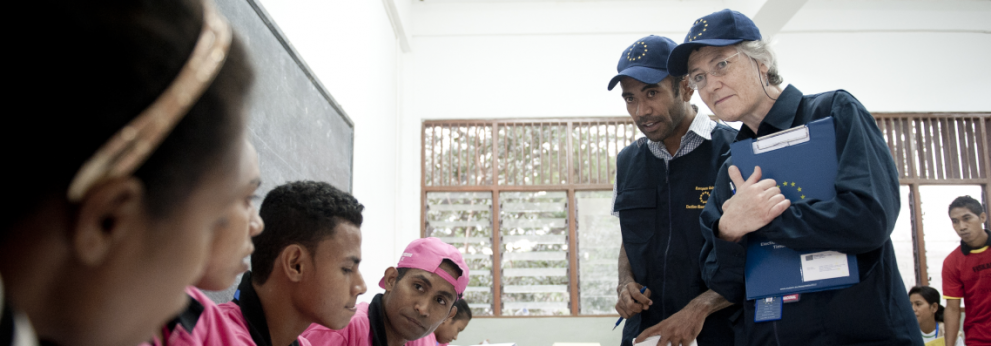
Elections are one of the defining bases of a functioning democracy. Election observation is part of the EU’s foreign policy with respect to support to democracy and human rights and the rule of law worldwide. It contributes to the strengthening of democratic institutions, building public confidence in electoral processes, helping to deter fraud, intimidation and violence. It also reinforces other key EU foreign policy objectives, in particular peacebuilding.
Key Facts:
- The European Union has become a leading force in international election observation that provides a comprehensive, independent and impartial assessment of all aspects of the electoral process;
- Deployment upon invitation by third country, decision by the High Representative/Vice-President, mission headed by a Member of the European Parliament as Chief Observer;
- On average 30 electoral missions per year deployed with an annual budget of around €45 million;
- The regions benefitting from EU Election observation missions are Africa, the Middle East, Asia, Latin America and the Caribbean (areas not covered by the Organisation for Security and Co-operation in Europe).
The purpose of the EU Election observation missions is to assist partner countries in holding elections of a high standard. The Election observation missions analyse the electoral process and provide an independent and impartial assessment of the elections. The methodology of the missions is based on a long-term approach, taking into account all aspects of the electoral process. The missions are grounded in international humanitarian law and provide recommendations to improve the democratic process around elections.
The list of priority countries for election observation is defined by the European External Action Service in consultation with the Service for Foreign Policy Instruments, Member States and the European Parliament. Election observation missions are conducted by the European Union in third countries upon invitation of the country holding the election. They are headed by a Member of the European Parliament (MEP) who acts as the mission’s Chief Observer.
The ultimate decision to deploy an Election Observation Mission rests with the EU High Representative/Vice-President following the recommendations of the relevant Exploratory mission.
In cases when conditions for a full-fledged Election observation mission are not met, but it is nevertheless deemed useful to follow an election process, the EU may deploy an Election expert mission. Such missions consist of two to four experts deployed several weeks prior to an election.
The role of the Service for Foreign Policy Instruments
The Service for Foreign Policy Instruments is the Commission service responsible for the administrative, financial and security aspects of electoral missions. The Service works closely with the European Parliament and Member States. After a decision to launch an Election observation mission, the Service ensures the operational and security needs of the mission through external contractors, and recruits the Deputy Chief Observer, the Core Team of analysts and the Long-Term and Short-Term observers to be part of the mission.
The Database of EU Election Missions provides easy access to final reports, mission statements and press releases of all EU missions since 2000 – around 300 missions as of today, and many more to come.
In order to facilitate the selection of EU election observers, the EU has developed an EOM Roster, which accelerates the process and makes it more transparent, impartial and uniform. All candidates interested in participating in an EOM have to register their candidature in the EOM Roster.
Calls for candidates for EU Election Observation Missions and related trainings
EU EOM implementation privacy statement
